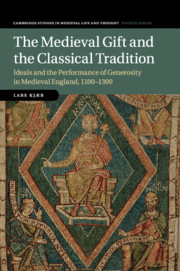Refine search
Actions for selected content:
8 results
Beyond “Athens and Jerusalem”: Integrating Classical Philosophy into the Comparative Study of the Hebrew Bible and the Ancient Near East
-
- Journal:
- Harvard Theological Review / Volume 118 / Issue 3 / July 2025
- Published online by Cambridge University Press:
- 22 October 2025, pp. 381-406
- Print publication:
- July 2025
-
- Article
-
- You have access
- Open access
- HTML
- Export citation
Chapter 1 - Boethius’ Philosophiae consolatio
-
-
- Book:
- Boethius’ ‘Consolation of Philosophy’
- Published online:
- 23 May 2024
- Print publication:
- 30 May 2024, pp 12-31
-
- Chapter
- Export citation
Introduction
-
-
- Book:
- Boethius’ ‘Consolation of Philosophy’
- Published online:
- 23 May 2024
- Print publication:
- 30 May 2024, pp 1-11
-
- Chapter
- Export citation

Boethius’ ‘Consolation of Philosophy’
- A Critical Guide
-
- Published online:
- 23 May 2024
- Print publication:
- 30 May 2024
Introduction
-
-
- Book:
- Ancient Women Philosophers
- Published online:
- 17 August 2023
- Print publication:
- 31 August 2023, pp 1-20
-
- Chapter
- Export citation
Chapter 2 - The Gift in Classical Literature
-
- Book:
- The Medieval Gift and the Classical Tradition
- Published online:
- 10 August 2019
- Print publication:
- 29 August 2019, pp 14-41
-
- Chapter
- Export citation

The Medieval Gift and the Classical Tradition
- Ideals and the Performance of Generosity in Medieval England, 1100–1300
-
- Published online:
- 10 August 2019
- Print publication:
- 29 August 2019
22 - Arnobius and Lactantius
- from A - LITERARY GUIDE
-
-
- Book:
- The Cambridge History of Early Christian Literature
- Published online:
- 28 March 2008
- Print publication:
- 01 April 2004, pp 259-265
-
- Chapter
- Export citation
